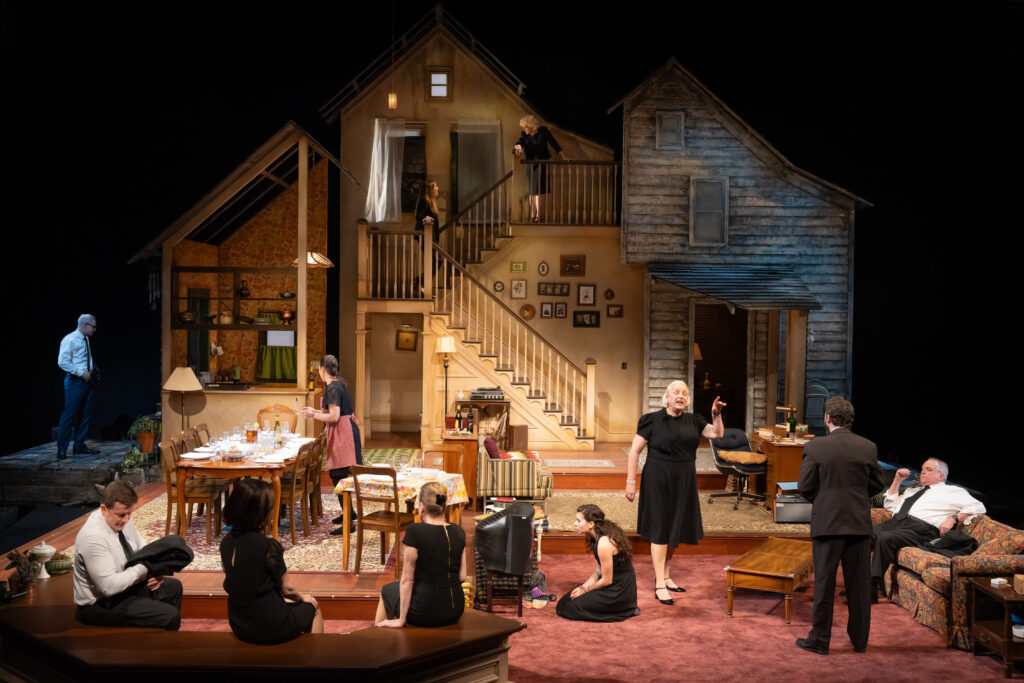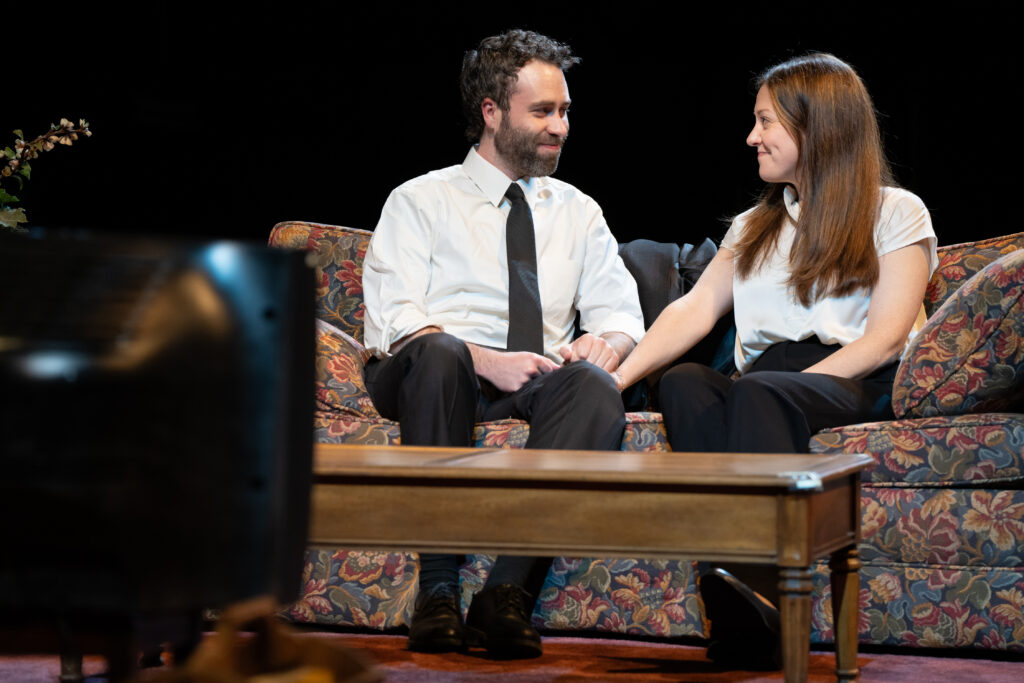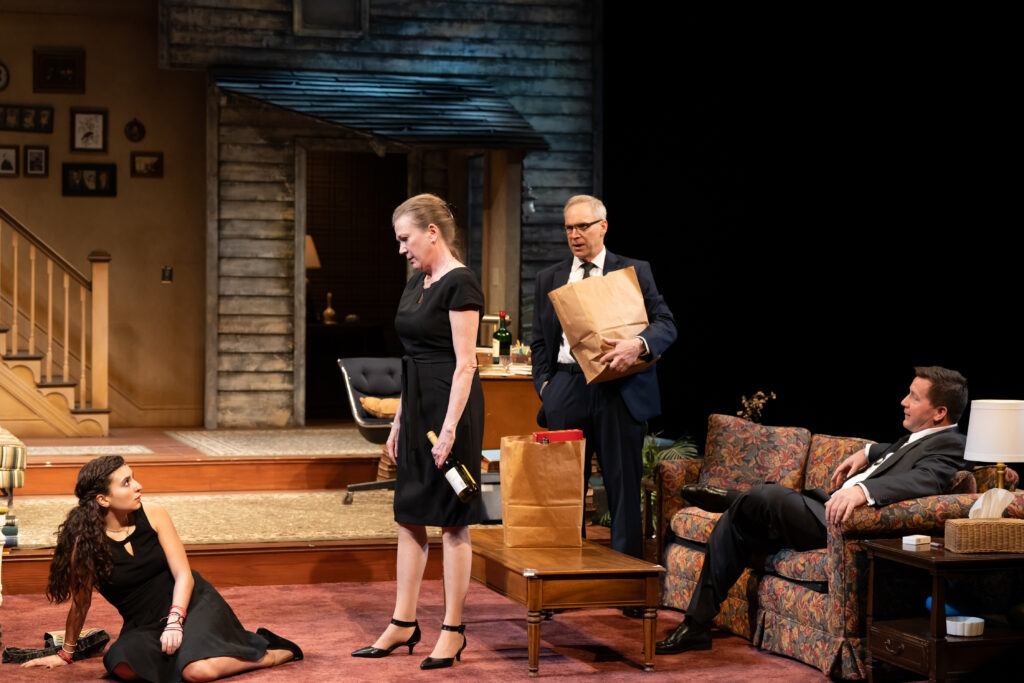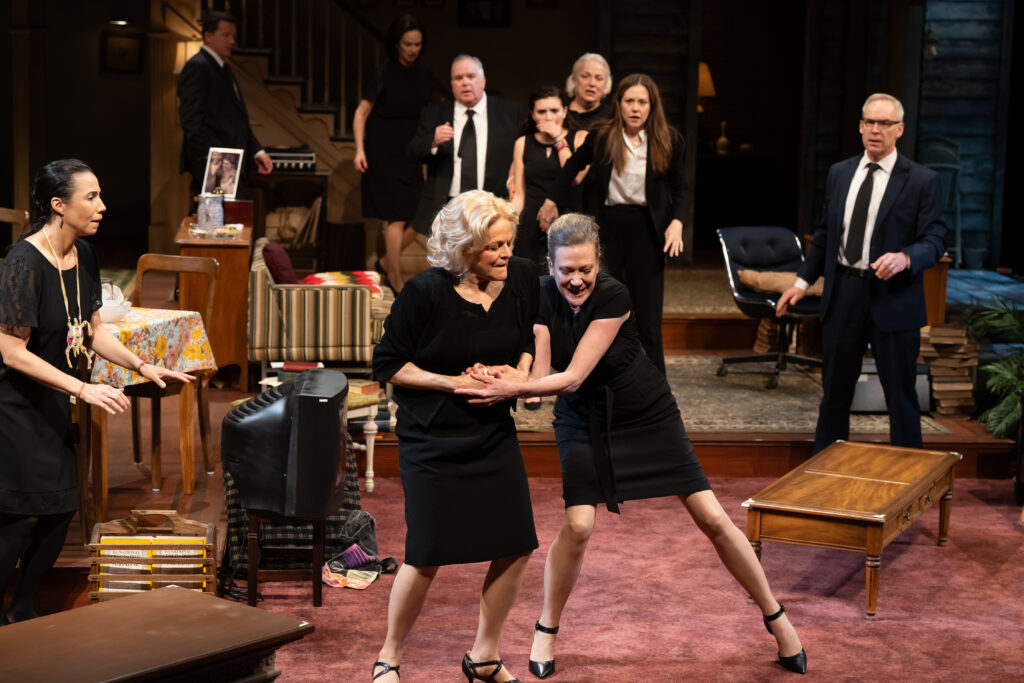By Lynn Venhaus
Tracy Letts’ “August: Osage County” retains all its dark edges, biting wit and unflinching truths in a brilliantly acted and thoroughly engrossing interpretation by The Repertory Theatre of St. Louis that enhances its stature as one of the great American plays.
Produced 17 years after its blistering and probing landmark premiere at the Steppenwolf Theatre in Chicago in 2007, the Pulitzer Prize and Tony-winning play taps into the raw emotions of a family scorched by addiction and dysfunction.
A brittle mosaic of family dynamics exposes how nearly all have been burned by their white-hot proximity to drug abuse, emotional abuse, alcoholism, unhealthy relationships, and mental health issues.
(I think more people can relate than may admit, but also the play can be triggering for some, so warning, and understandable; there are resources to call listed at the Rep.)
To play these distinctive, damaged characters, this seamless large cast (13!) has developed an admirable rhythm with each other that shows facets of their personalities while revealing their vulnerabilities and coping mechanisms. They are fooling only themselves (and are they that unaware?)

Because of Letts’ extraordinary insight into the human condition and his exceptionally nimble dialogue, these are some of the meatiest roles of the new millennium.
“They” always say write what you know, and Letts based this play on his maternal grandparents. Charlie Chaplin once said, “Life is a tragedy when seen in close-up, but a comedy in long shot,” and Letts knows that all too well. He is also a gifted humorist, seeing life from both sides.
A window into his family’s soul, Letts skillfully outlined characters that these well-cast current actors have shaded into fully dimensional people that make us think, feel, and connect – and recoil, disengage from, and are horrified by, too.
The ensemble does not strive for black-and-white definitions, but rather leans towards the more fascinating gray areas, which make their thoughtful, layered performances convincing.
Front and center is the ferocious, drug-addled matriarch Violet, who reminds everyone ‘nothing gets by’ her but is often in such a stupor from popping prescription painkillers that she is most unpleasant to deal with in any meaningful way. Suffering from mouth cancer, she is also a heavy drinker and smoker. Her paranoia and mood swings are alarming, and she often cruelly targets anyone in her radar.

Sometimes, she waits until she can unleash the hurt for maximum effect. Ravaged by her demons, visible are the metaphorical open wounds from an impoverished, abusive childhood that will never heal.
Ellen McLaughlin’s virtuoso performance as this complicated wife, mother, sister, and vicious addict left me in awe. She flawlessly bristles with various degrees of impairment, then rambles or snipes, all in a rural Southwest accent. She’s haunting and unforgettable, among the pantheon of astounding actresses who have graced The Rep’s thrust stage.
The role, in many ways, can be compared to Mary Tyrone in Eugene O’Neill’s magnum opus “Long Day’s Journey into Night,” published posthumously in 1956, which dared to address a matriarch’s addiction and its ripple effect on a family.
The main story is that Violet’s husband, Beverly (Joneal Joplin), an alcoholic poet and former college professor, has gone missing. Their 30-year toxic relationship has resulted in two of their three daughters escaping to live elsewhere –Barbara (Henny Russell) in Colorado and Karen (Yvonne Woods) in Florida. Ivy (Claire Karpen) stayed in their small town but lives on her own.
After several days go by, family members return to the fold, with fireworks ensuing in a large country home outside Pawhuska, Okla., 60 miles northwest of Tulsa. The time period is a hot dusty August 2007.

The adult daughters are played by three equally strong actresses, and even if you didn’t know what order they were in, you’d figure it out quickly – Barbara, the controlling eldest can’t keep her own life from falling apart (fight); Ivy, the unfulfilled middle child (froze); and self-absorbed Karen (flight). They are all keeping secrets about their relationships. Their family hierarchy roars here.
Barbara is separated from Bill (Michael James Reed), a college professor whose infidelity has caused a riff, but they are going through the motions in front of the family. They have brought their 14-year-old daughter Jean (Isa Venere) along, and she’s ready to burst out of a cocoon like most teenage girls.
In a mother-daughter chat, Barbara wisely tells Jean: “Thank God we can’t tell the future, or we’d never get out of bed.” It’s just one of Letts’ lines of astute dialogue that the audience responds to, recognizing themselves.
Bill is an ingrained family member, clearly respected by Violet, and considered a rock by others, and Reed straddles that turmoil without losing Bill’s humanity. Tightly wound Russell immediately indicates Barbara’s lifelong pattern of confrontations with her overbearing mother.
Breezing in from Miami, flighty Karen has a new fiancé in tow, thrice-married Steve (Brian Slaten), giving off a vibe as a player — yet Slaten takes his time bringing out his inner creep. Woods, as Karen, appears to not grasp the seriousness of the family’s despair (or is unwilling to do so).

Introverted Ivy shields her personal life, and Karpen heartbreakingly expresses how disconnected she is from her sisters. Violet is always finding fault with her actions and appearance.
The Aikens arrive, and they are the Westons’ extended family. Hardened Mattie Fae (Astrid Van Wieren) is Violet’s blustery sister, and she’s nagged Charlie (Alan Knoll) over the years. He’s a decent guy who puts up with a lot, valued Beverly’s friendship. Their downtrodden son, Little Charles (Sean Wiberg), incurs Mattie Fae’s ire at every opportunity while Charlie sticks up for his sensitive boy.
Van Wieren and Knoll are remarkably sturdy in their roles, bringing out qualities I hadn’t noticed in three prior productions. Knoll is the lynchpin here, and it’s such a deftly delivered performance, crisp in its comic timing, and gut-wrenching in its ruefulness. Long a veteran actor, this just may be Knoll’s finest hour (or three).
Van Wieren may look familiar if you have seen “Come from Away” on Broadway (or the Apple TV+ filmed production) – she played Beulah starting in 2017. She shows how loudly Mattie Fae’s buttons are pushed, but also why she’s like she is.
The observer here is quiet but smart Johnna (Shyla Lefner), a kind and considerate Native American woman from the Cheyenne tribe, who Beverly hired as a live-in housekeeper. She becomes a steadfast, reliable presence, witness to the never-ending dramas, and intervening only when necessary. Nonjudgmental, she endures Violet’s haughty diatribes and harsh commentary.

In the brief role of Sheriff Deon Gilbeau, Barbara’s old high school boyfriend, David Wassilak, makes it his own with clear-eyed compassion.
This cast is so riveting that you do not feel the play’s 3-hour and 20-minute runtime. When the second intermission happened, I thought “already?” That’s how enthralling this show is.
Directed by Amelia Acosta Powell, she understands the agitations and anguish of this family, and brings out the many levels of pain. There is a specific ebb and flow she achieves, and what culminates in the disruptive family dinner post-memorial service is one of the all-time jaw-dropping segments in live theater.
I do have a few quibbles about blocking, particularly building intensity between Barbara and Violet – I prefer a closer proximity to be more effective, but it shows how a family that ignores the elephant in the room will always have it blow up in their faces at some point.
The Americana musical interludes composed by Avi Amon help establish the setting, while Amanda Werre’s smooth and perceptible sound design is her customary top-notch work. At first, lighting designer Xavier Pierce’s work was too dark, but gradually evened out according to the action, and the shadows are an extension of the house’s buried secrets.

Scenic Designer Regina Garcia fashioned a large interior, with some exterior nooks, using classic American furniture, but the shingles on a portion of the rooms inside were puzzling (I know, imagery, not literal)..
Sonia Alvarez’s contemporary costume design for casual attire suits the characters and the period, and the mourning outfits are spot-on, especially Violet’s black dress – reflecting what she used to look like before hard living took its toll. Noteworthy is Alison Hora’s wig design too.
Also notable is Michael Pierce’s fight choreography and Rachel Tibbetts’ and Will Bonfiglio’s intimacy coordinator work.
Shakespearean in tone and temperament, but truly an American masterpiece for the 21st century, Letts’ ruminations on life’s passages, aging, blood ties, and identity above all reflect on humanism.
While families can pour their own gasoline on deep-rooted issues without any assistance in real-life (and there are those who don’t see the need to pick at the scabs of their past), this retelling has an energy and an electricity that only the most genuine experiences can achieve, catharsis optional.
Letts has superbly blended the sharp wit of an observational humorous sitcom/stand-up special with the emotional turbulence of lively soap operas to expertly craft a relatable family in crisis.
Gloria Steinem said, “the healing is in the telling,” and it is my hope “August: Osage County” reaches people who may be in a painful place, who may leave with a modicum of hope, because if anything, we are not alone.
And no matter how regretful or defeated others are by their actions, the play says they are not us, and that trajectory can change. The Weston-Aiken clan holds a mirror up that is sharply in focus.

The Repertory Theatre of St. Louis presents “August: Osage County” from March 19 to April 7 at the Loretto-Hilton Center, 130 Edgar Road, St. Louis.
Tickets: Purchase tickets online at Repstl.org, by phone at 314-968-4925, or The Rep Box Office will also be available for in-person support at the Loretto-Hilton Center Tuesdays and Wednesdays from 10:30 a.m. – 5 p.m. and 2 hours before curtain.
Rush Tickets: Available for students, seniors, educators, and theatre professionals by calling the Box Office at 314-968-4925, 1 – 2 hours prior to curtain time.
Audio-Described Performance: Thursday, April 4 at 7 pm – the show will be described for patrons who are blind or have low vision.
ASL Performance: Saturday, March 30 at 4 pm – the show will be signed for the deaf or hard of hearing.
Open-Captioned Performance: Sunday, April 7 at 2 pm – an electronic text ticker displays words being spoken or sung onstage.
Post Show Discussions follow Saturday, March 30 at 4 pm and Wednesday, April 3 at 2 pm performances.

Lynn (Zipfel) Venhaus has had a continuous byline in St. Louis metro region publications since 1978. She writes features and news for Belleville News-Democrat and contributes to St. Louis magazine and other publications.
She is a Rotten Tomatoes-approved film critic, currently reviews films for Webster-Kirkwood Times and KTRS Radio, covers entertainment for PopLifeSTL.com and co-hosts podcast PopLifeSTL.com…Presents.
She is a member of Critics Choice Association, where she serves on the women’s and marketing committees; Alliance of Women Film Journalists; and on the board of the St. Louis Film Critics Association. She is a founding and board member of the St. Louis Theater Circle.
She is retired from teaching journalism/media as an adjunct college instructor.


